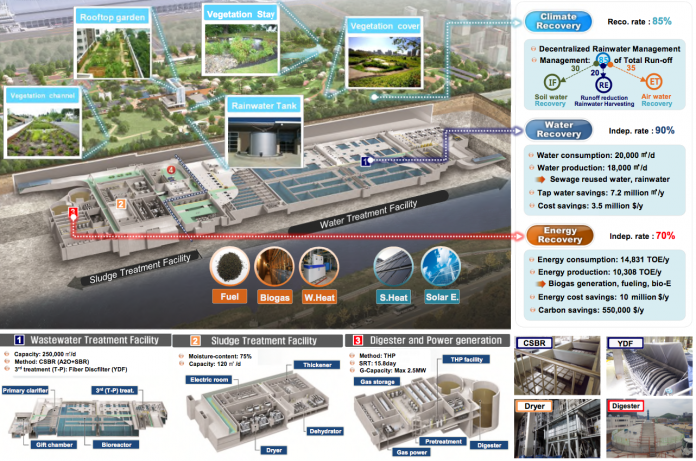The International Water Association’s Best Practices on Resource Recovery from Water Award 2017, has been won by technology provider POSCO Engineering and Construction. The award, shared jointly with the Korea Environment Corporation (K-eco) and the city of Anyang, is for the water- and energy-independent wastewater treatment plant in Saemul Park, Anyang, South Korea.
The Saemul Park plant has been constructed underground to ensure greater acceptability with local communities, and allows the surface area above it to be used as a park. The award-winning part of the plant all happens underground. Innovative technologies have allowed the treatment plant to become energy self-sufficient through the production of biogas, while simultaneously recovering water and other valuable resources. The plant has significantly reduced its carbon footprint by reducing greenhouse gas emissions and introduced a ‘Positive Impact Development’ tool to monitor the overall achievement.
“Anyang Saemul Park sewage treatment plant realises three types of resource recovery: water, energy and the climate,” said Kwak Donggeun of POSCO Engineering and Construction, upon receiving the award. “The plant is special because it also includes small water cycle balance for climate recovery through a decentralised rainwater management system. It’s an example of how a sewage treatment plant can be transformed from one where energy is consumed and water lost, to the one that produces energy and collects water as a resource.”
Recovering water and other vital resources like biogas, metals, phosphates and bioplastics from wastewater are critical to deliver a sustainable water sector. The 2017 Award, in partnership with the international knowledge network, WaterShare, is for a proven technology on resource recovery, applied at full or demonstrative scale, which serves as an excellent example for the water sector.
“This award is based on two sets of evaluations, one by academics, the other by practitioners,” said Professor Willy Verstraete, chairman of the judging panel. “A winning solution must be scientifically sound but also able to be scaled up in the real world. That is quite a challenge and, for the successful winner, a great achievement.”
The winning entry receives the award because it represents the best example of a large-scale, economically feasible, and impactful project that uses resources from the water cycle and transfers scientific knowledge.
“By mutually sharing and learning from the experiences of different areas as well as from colleagues from other regions, performance improvement and creative application of innovative solutions will be possible,” said Kees Roest of WaterShare.








